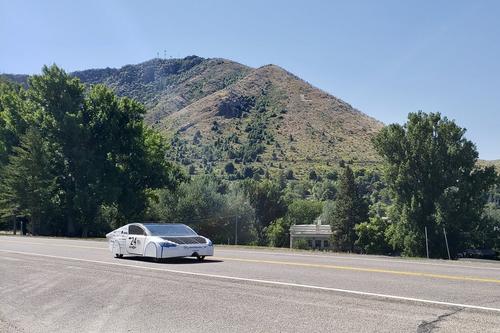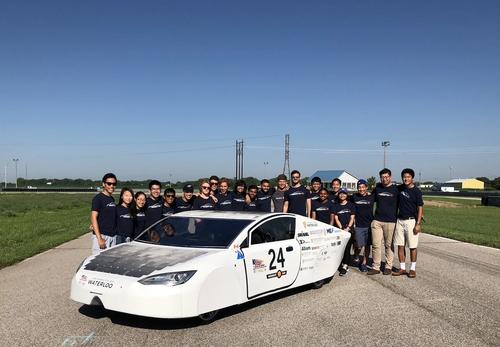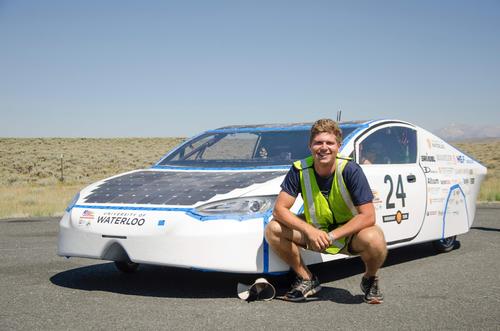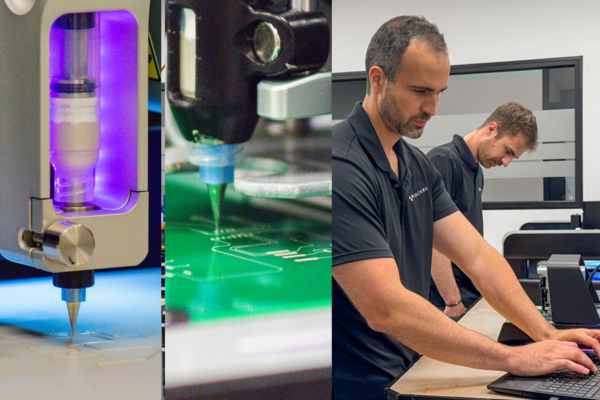
Midnight Sun builds on winning past
Real-world experience working on a Waterloo vehicle team helped an undergraduate student land a plum co-op job at Tesla

Real-world experience working on a Waterloo vehicle team helped an undergraduate student land a plum co-op job at Tesla
By Megan Vander Woude Faculty of EngineeringReal-world experience working on a Waterloo vehicle team helped an undergraduate student land a plum co-op job at Tesla.
Members of the company’s hiring committee were so impressed with Devon Copeland’s work with Waterloo’s Midnight Sun Solar Car that they asked him to make a presentation about his involvement with the team.
“They were really interested because a lot of the engineering challenges Tesla faces are very similar to what we’ve faced with Waterloo’s solar car,” explains Copeland, a fourth-year Waterloo mechatronics engineering student. “We’re both working on an electric car and we even both use the same cells in our battery packs.”
Copeland was the mechanical lead for the team’s 2018 Midnight Sun Solar Car that competed in the American Solar Challenge (ASC) last July.
Of the 42 teams registered, only 13 completed the grueling 2,700 km race across Nebraska, Wyoming, Idaho and Oregon. Midnight Sun was the first Canadian entry to finish the ASC with a cruiser-class vehicle and took third place overall.

Midnight Sun was the first Canadian entry to finish July 2018’s American Solar Challenge with a cruiser-class vehicle.
The team’s award-winning car was its second entry in the cruiser class, which includes driver and passenger seating. After designing and building challenger-class – single seat – vehicles, members shifted gears in 2014 to build their first cruiser.
In the two years between each ASC, most teams build on their existing car, hopefully improving its performance from one challenge to the next. Moving to the cruiser class forced Midnight Sun to build a new car from scratch.
Midnight Sun built its first cruiser for the 2016 ASC. After two years of design work, manufacturing, and assembling the car, it didn’t qualify for the race.
“We were devastated,” says Copeland. “It didn’t qualify for the race. It didn’t drive a single lap at the competition. It didn’t work out the way we wanted or planned.”
After the 2016 competition, the team was deflated – but members also saw an opportunity to use what they had learned and start over.
“I thought what other time in my life will I have the opportunity to design and build an entire car from scratch,” says Copeland. “It’s not everyday that you get to do this.”
For its next car, the team made another attempt in the cruiser class, starting with a completely new design. Using valuable lessons from the first cruiser, they were determined to qualify for and finish the 2018 ASC.
“Our goal wasn’t to win the competition,” says Copeland. “We wanted a reliable and safe car that could complete the ASC. We didn’t think we’d be able to compete with the top-tier teams because we didn’t have the experience or the money.”
The top teams at the ASC often have budgets well over $1 million (USD), which they use to redesign their existing cars.
In comparison, Midnight Sun worked with a budget of $150,000 (CAN) to design and build a totally new vehicle. Members had to be scrappy – sourcing affordable materials, manufacturing parts themselves, and limiting the number of spare parts they purchased.
Despite intense timelines and low funds, Midnight Sun was not only a top competitor at the ASC, but it won the perseverance award.

Of 42 teams registered, Waterloo’s was one of only 13 to complete the American Solar Challenge’s 2,700 km race across Nebraska, Wyoming, Idaho and Oregon.
“It was one of the most gratifying experiences of my life,” says Copeland. “To drive with a car that we had designed and built from scratch for 2,700 km – it was unbelievable.”
For Copeland, the ASC achievement is just one piece of his experience with Midnight Sun. Being on a student design team helps him test the knowledge he learns in the classroom and puts his engineering skills into practice.
“Every course I’ve taken had something applicable to the team and the project,” he explains. “It’s the thing that has grounded my education more than anything. For me, and a lot of people on this team, we’ve gotten exposure to so many things that are applicable to the real world.”

Devon Copeland, a Waterloo mechatronics engineering student, was the mechanical lead for the team’s 2018 Midnight Sun Solar Car.
Team members are already working on their next vehicle, an all-new design targeted to be twice as efficient as last year’s cruiser. It will carry a total of four passengers and make its debut at the 2020 ASC.
Midnight Sun is completely self-funded. If you’d like to support the team in its next competition, please consider donating to help fund materials, ASC fees, and other costs.

Read more
Here are the people and events behind some of this year’s most compelling Waterloo stories

Read more
Waterloo Engineering alum wears her iron ring proudly while building her career in quantum tech in Germany

Read more
Voltera prints electronics making prototyping faster and more affordable — accelerating research to market-ready solutions
The University of Waterloo acknowledges that much of our work takes place on the traditional territory of the Neutral, Anishinaabeg, and Haudenosaunee peoples. Our main campus is situated on the Haldimand Tract, the land granted to the Six Nations that includes six miles on each side of the Grand River. Our active work toward reconciliation takes place across our campuses through research, learning, teaching, and community building, and is co-ordinated within the Office of Indigenous Relations.